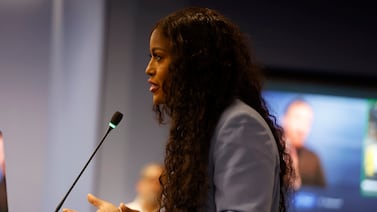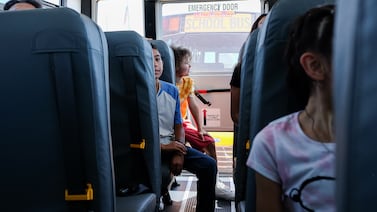A former state legislative candidate and avowed progressive political activist is running for an at-large seat on the Denver school board.
Nicky Yollick did not attend Denver Public Schools, nor is he a current parent. But he said he was inspired to run for the board because he hopes to be a parent soon. He and his partner, Nicki, plan to start a family once she graduates from nursing school, he said.
“Nicki is a person of color; our children will be children of color,” said Yollick, who is white. “I want them to be educated in a far more equitable system than what DPS currently represents.”
Yollick, 35, lives in northeast Denver but said he’s running to represent the entire city in part because he believes the seat in northeast Denver, which is also up for grabs, should be held by a person of color given the demographic makeup of that region.
In all, 12 candidates are running for four open seats in the Nov. 2 election. The winners will help lead a district that is still navigating the COVID-19 pandemic and trying to make up for a year and a half of disrupted learning. The board will oversee a new superintendent, craft a new strategic plan, and grapple with several long-simmering issues, including declining enrollment and continued disagreement over the role of independent charter schools and semi-autonomous innovation schools.
Yollick moved to Colorado in 2008 to attend graduate school at the University of Denver, where he studied international relations. He became active in progressive politics, working on several federal campaigns and a push to turn out Latino voters.
He ran for a state House seat in 2018 but did not win. That same year, he helped pass a measure at the Colorado Democratic state assembly critical of education reform, a philosophy supportive of independent charter schools that is often at odds with teachers unions. The platform amendment, a symbolic step with no real-world impact, called on Democrats for Education Reform to stop using the term Democrats in their name.
Yollick has also been involved with Denver school board politics, having worked on the campaigns of at least three past board candidates. Two did not win and one withdrew before the election. Yollick helped found a coalition of community groups in 2019 to endorse board candidates, but the group failed to come to consensus. He is currently unemployed.
Yollick promised he’d be different from candidates who claim to be progressive but aren’t.
“Denver communities know I’m solidly in the progressive camp, and I don’t plan on budging one bit as a candidate or as a director on the board,” Yollick said.
If elected, he said he’d focus on cutting the district administration to funnel more money directly to schools, and giving teachers and community members more power over district decisions. He floated the idea of a community committee that would come up with recommendations for the board every three months. The board would be required to vote them up or down.
Denver Public Schools is Colorado’s largest school district, serving about 90,000 students. A little more than half of students are Hispanic, 26% are white, and 14% are Black. Its school board has seven members — five regional and two districtwide.
We asked Yollick about several key issues the district will face in the coming years.
Declining enrollment and a growing number of small schools: Working with the community, the district should come up with a plan for each neighborhood of how it’s going to support the schools there, Yollick said.
If the district has to close a school because of low enrollment, he said he wants it “to have this long-term view so we can give communities at least two full years where we say, ‘I’m sorry, this school is slated for closure, but we want to work with you.’ … We’re not just going to sneak up on the community and close schools.”
Charter and innovation schools: His views on independently run charter schools and semi-autonomous district innovation schools have evolved over time, Yollick said. While charters “generally do a good job for students,” Yollick said, he still has some concerns that they encourage competition between schools by asking families to choose them and that, along with many innovation schools, charters don’t provide job protections for teachers.
“I don’t want us to go around vilifying the school model,” Yollick said. “We need to get into the details of, what are our concerns with charter and innovation schools as far as potentially exacerbating inequality in the district among students and staff.”
Improving education for Black and Hispanic students: Yollick described the board’s 2019 Black Excellence resolution, which directs the district to better serve Black students, as “spectacular.” But he said he’s concerned about the way it’s being carried out, with wide variation in the quality of individual schools’ plans for doing so.
“Once these decisions have been made, we need strong central direction,” Yollick said. “If the schools are able to be proactive and to be successful in a more autonomous way, then sure, central administration should not impinge on their ability to do so. But if some schools might be falling behind ... I’d want the central administration to come in as a helper.”
The district should cut spending on central administration and marketing, among other things, to redirect resources toward carrying out the Black Excellence resolution and improving programming for students learning English as a second language, he said.





